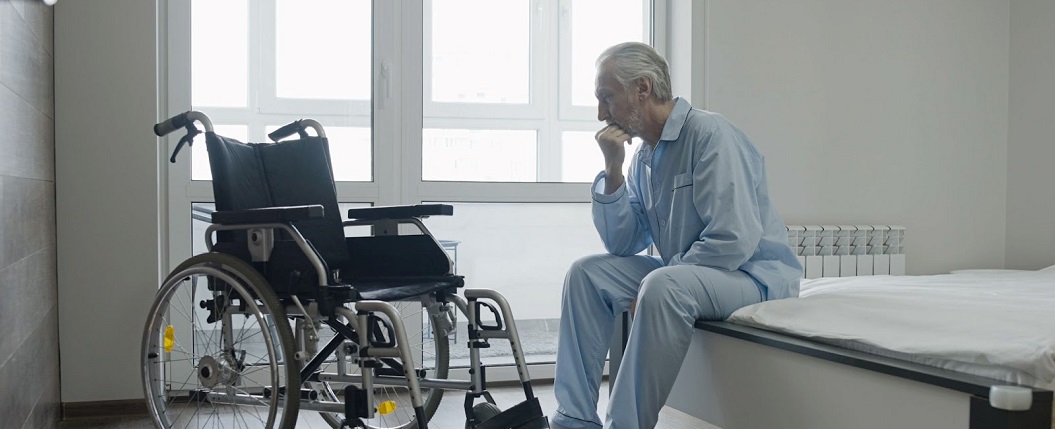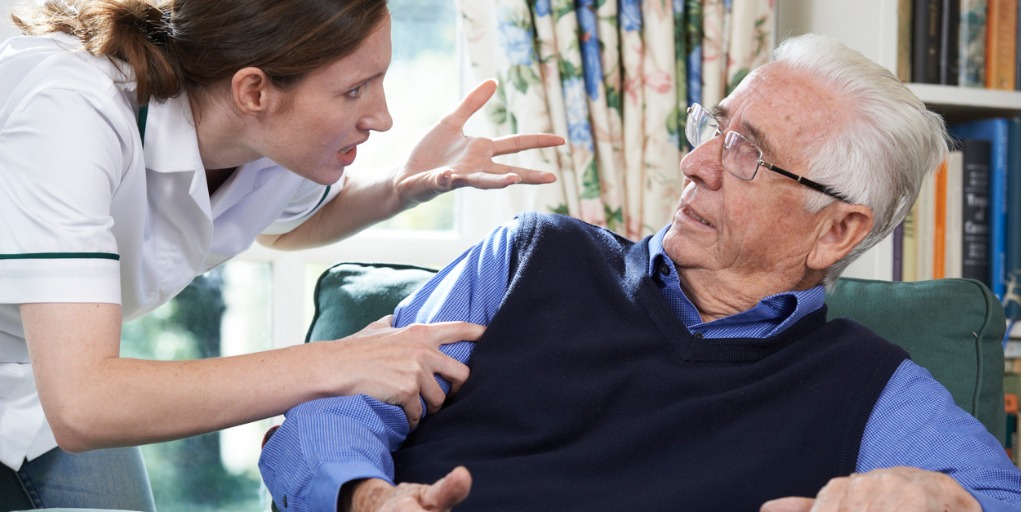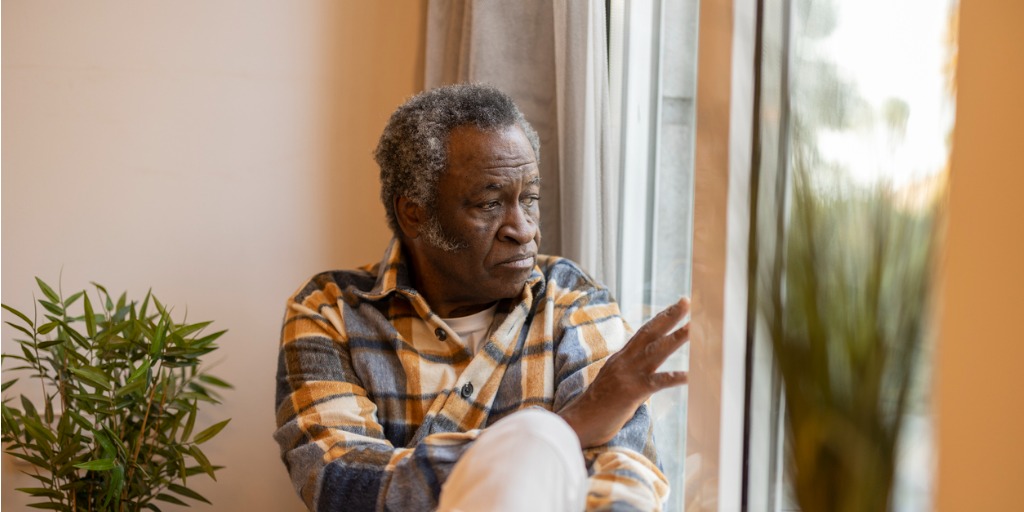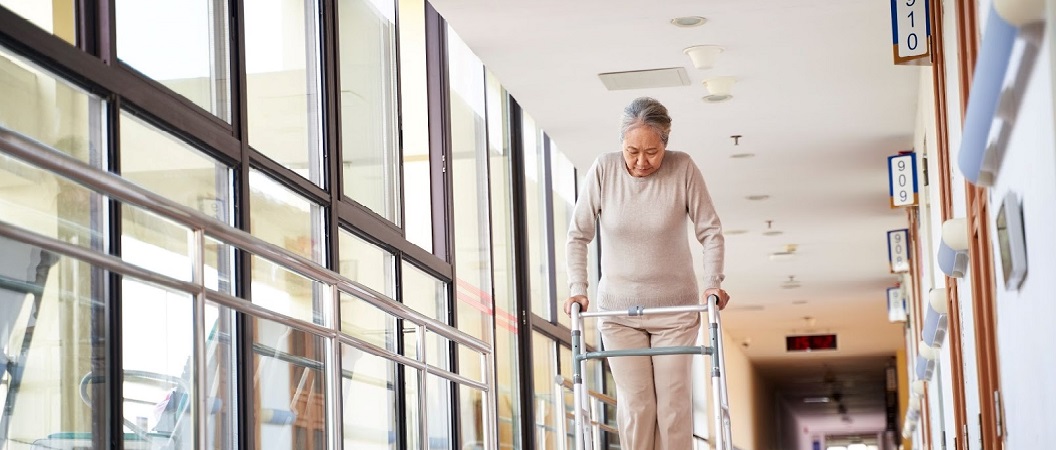Florida nursing home abuse attorney
If you or a loved one has been the victim of nursing home abuse, you could be entitled to compensation for your damages.
Help us put an end to abuse and neglect. Our Florida nursing home abuse attorney can help you collect the maximum compensation you’re entitled to. Contact us today to speak with our Florida personal injury lawyers.

What should you do if you suspect abuse?
If you see signs of abuse, here’s a step-by-step guide on what to do.
Speak with them
Speaking with the victim of elder abuse is the first step to collecting information. However, it might not always be possible. For example, they might have a condition that impacts their memory, or they might not be able to communicate clearly, especially regarding something traumatic, such as abuse they might be enduring.
Make detailed notes of possible abuse.
Write down everything you notice that seems out of place. For example, note the way your loved one is acting, how they look, their behavior, and any marks or wounds you see. When you do notice a mark or wound, ask your loved one how they got their injury, and keep track of how long recovery takes or if it worsens.
Gather evidence to support your suspicions.
Collect anything you can that you feel might support your belief that your loved one is being abused. This can include medical records, pictures, financial records, and even witness reports.
Contact the authorities
Contacting the appropriate authorities and making an official report of the suspected abuse provides an essential piece of evidence in your case that your Florida nursing home abuse attorney can use.
Consult a Florida nursing home abuse lawyer.
Reaching out to a Florida nursing home abuse attorney as soon as possible after you’ve detected the signs of abuse helps you achieve the best possible outcome in your case. Your attorney will collect the evidence you need to make the most of your case by putting legal instruments like depositions, interrogatories, and subpoenas to work.
How to report abuse in Florida
You can report suspected nursing home abuse to the Florida Agency for Healthcare Administration, or the Florida Ombudsman Program Contact the police immediately if you have any reason to believe your loved one may be in imminent danger.
Types of nursing home abuse

Unfortunately, there’s no shortage of nursing home abuse, which can come in many forms, including the following:
Physical abuse
Examples of physical abuse include slapping, punching, pushing, or unreasonably restraining a resident.
Emotional abuse
Emotional abuse includes intimidation, humiliating the resident, isolating them, or verbally abusing them.
Neglect
Forms of neglect include withholding food or drinks, failing to help with hygiene, failing to provide medical care, and many others.
Financial abuse
Financial nursing home abuse can include stealing a resident’s property or money, pressuring them into providing their debit card and PIN and forging their name on financial documents.
Sexual abuse
Not only does sexual abuse include sexual assault and rape, but also sexual harassment and indecent exposure. Any type of unwanted fondling or touching could also constitute sexual abuse.
Make sure you file on time.
In Florida, you have a two-year statute of limitations (or deadline) to file a lawsuit. The clock starts ticking the date the abuse was discovered or the date the abuse should reasonably have been found. If you wait until the statute expires, you won’t have any legal recourse for obtaining compensation on your loved one’s behalf.
Who can file a lawsuit against a nursing home in Florida
Under Florida Statute 415.1111, any of the following people can file the lawsuit:
- The victim or vulnerable adult
- Their legal guardian
- A person or organization acting on behalf of the abused person with their consent or the consent of their guardian
- The personal representative of the estate if the victim has died, regardless if the death was caused by abuse, neglect, or other exploitation.
What are the potential damages you can claim?
Two main categories of damages are recoverable through a nursing home abuse lawsuit – economic and non-economic. If the lawsuit is brought after their death, there may be other damages available such as loss of consortium, however, the ability to recover those damages will depend on the specifics of the case.
Economic
Economic damages include easily quantifiable losses that are supported by invoices. One of the most common types of economic damages in a nursing home abuse case is medical bills such as prescription costs, hospital stays, surgery, physical therapy, and more.
Non-economic
Unlike economic damages, which have receipts, non-economic damages are subjective and don’t have a value based on pieces of paper. These include things like pain, suffering, and emotional or mental trauma.
What are signs of abuse to look for?
Since nursing home abuse can take many forms, making sure that your loved one is being adequately taken care of might require taking a closer look at them, their environment, and their current status. Here are some things to look at if you suspect your loved one might be suffering from abuse.

Physical clues
Some common physical clues of abuse begin with cuts, scrapes, bruises, frequent wounds, wounds that aren’t healing or are taking too long to heal, and more. These signs could be more accessible to identify if they’re in visible locations, but sometimes they can be hidden beneath clothes.
Some other physical clues are more complex to spot, like changes in movement or difficulty performing tasks like in the past.
Physical clues can also include any changes in the behavior of your loved one. If their energy levels or mood have taken a turn for the worse, then they might be experiencing the deteriorating effects that come with long-term nursing home abuse.
Mental & emotional clues
If you don’t see any exterior signs of abuse, but your loved one in the nursing home seems less content or excited about life, this could be due to mental and emotional abuse.
Common signs of mental and emotional abuse include withdrawing from social interactions. Changes in mood or irritability may also occur as the abused older person often cannot act against their abusers, so their frustrations might be vented in other areas.
Financial clues
Financial abuse can include the theft of personal belongings but can also involve identity theft or outright theft of money by gaining illicit access to the older person’s accounts or forging checks from their accounts.
Abusers can also manipulate the elderly into getting their banking information or convincing them to transfer money into their accounts.
Do certain conditions make abuse more likely?
Some conditions make the elderly more vulnerable to abuse and less likely to be able to report it.

Alzheimer’s and dementia
When someone has a condition that impacts their memory, nursing home abuse is especially tragic. Although persons with Alzheimer’s or dementia might not remember the cause of their pain, the symptoms and injuries associated with abuse linger long after the actual abuse.
Physical weakness
If an elderly person is physically weak, they might be incapable of defending themselves against acts of aggression or abuse.
Stubbornness
Some elderly persons are unwilling to admit they’ve been abused due to stubbornness or pride. They know that what’s being done to them is wrong, but they would instead not tell anyone about it because they’re upset that they can’t stop the abuse on their own.
Social isolation
Nursing home abuse can persist indefinitely if an elderly person is socially isolated and others aren’t able to observe and assess their condition regularly.
Can multiple parties be held liable?
One of the many reasons you’ll need a Florida nursing home abuse attorney is that this kind of case can be very complex. The main reason for its complexity is that several parties could be responsible for your loved one’s abuse – they must all compensate you and your loved one as a result. Examples include the following:
Nurse or caregiver
The nurse or other caregiver entrusted with your loved one’s care may have committed a form of abuse, whether it’s at a nursing home, a doctor’s office, or within the victim’s own home.
Nursing home facility
The facility itself could have been negligently maintained, leading to an accident that injured your loved one. Administrators may not have properly vetted staff members who committed the abuse. Inadequate supervision of their employees and the patients can also lead to the facility itself being held liable.
Third-party device manufacturer
If your loved one suffered an injury due to a faulty bed, walker, or any other piece of equipment, you may be able to sue the manufacturer. The company could have negligently designed the equipment or manufactured or marketed the device negligently.
Third-party trespasser or contractor
Someone not associated with the facility could be responsible for the abuse. Not only will they face criminal action, but they could also be held liable for this civil action.
How can our attorneys prove abuse?
A Florida nursing home abuse attorney with Lytal, Reiter, Smith, Ivey & Fronrath will conduct a detailed investigation to determine not only what happened but also who is to blame.
We’ll collect additional evidence beyond what you can obtain, such as personnel records for everyone who works at the facility, any past lawsuits filed against the facility, and more. We’ll work diligently to build the strongest case possible to increase the chances of a positive outcome.
What’s the cost of hiring a Florida nursing home abuse attorney?
While you might think that your local Florida nursing home abuse attorney will be too expensive to afford, this simply isn’t the case. You can reach out to us today for a risk-free, cost-free consultation of your situation. If you feel that we’re a good fit for your case and hire us, we only get paid if we win.
Our Florida nursing home abuse attorneys can help.
Working with a Florida nursing home abuse attorney to advocate against nursing home abuse will help you maximize the amount of compensation you or your loved one is entitled to. Hopefully, that will ease the burden this has caused on your day-to-day life.
Schedule a consultation with your Florida nursing home abuse lawyer from Lytal, Reiter, Smith, Ivey & Fronrath by calling (561) 655-1990.
Areas we serve
West Palm Beach nursing home abuse lawyer
Boca Raton nursing home abuse lawyer
Discover your legal options today.
Our Recent Settlements




Our recent settlements


Discover your legal options today.Don't pay for someone else's negligence. Let us help.
"*" indicates required fields
Office Locations
-
515 N Flagler Dr 10th floor
West Palm Beach, FL 33401 -
110 SE 6th St
Ste 1410
Fort Lauderdale, FL 33301 -
2200 Broadway Space 301
Fort Myers, FL 33901
-
1850 SW Fountainview Blvd Ste 207
Port St. Lucie, FL 34986 -
150 E Palmetto Park
Suite 840
Boca Raton, FL 33432
- Phone: (561) 655-1990
- Fax: (561) 832-2932
- Español: (561) 833-1964
- EMAIL: info@foryourrights.com
COPYRIGHT © 2024 LYTAL, REITER, SMITH, IVEY & FRONRATH
PRIVACY POLICY
Important Notice: Safety is our top priority at Lytal, Reiter, Smith, Ivey & Fronrath. You can access our services from home via phone, online chat, Facetime, or Zoom. Our aim is to provide justice while safeguarding everyone’s health.
Developed and Optimized by



